
This guide for instructors gives guidance on using AI and ChatGPT in teaching.
- Subject:
- Computer Science
- Information Technology
- Material Type:
- Module
- Teaching/Learning Strategy
- Author:
- University of Arizona Libraries
- Date Added:
- 10/20/2023

This guide for instructors gives guidance on using AI and ChatGPT in teaching.

The Creative Commons copyright licenses and tools forge a balance inside the traditional “all rights reserved” setting that copyright law creates. Our tools give everyone from individual creators to large companies and institutions a simple, standardized way to grant copyright permissions to their creative work. The combination of our tools and our users is a vast and growing digital commons, a pool of content that can be copied, distributed, edited, remixed, and built upon, all within the boundaries of copyright law.

You can use CC-licensed materials as long as you follow the license conditions. One condition of all CC licenses is attribution: crediting the author and giving the source information. Generally speaking, attribution must reasonably include all relevant information supplied by the licensor. Because each use case is different, you can decide what form of attribution is most suitable for your specific situation. The following examples are intended to illustrate what typical prudent practices look like. We expect community norms and expectations to evolve with time, and will adapt this guide accordingly. In addition to attribution, there are also things to consider as a licensor or a licensee. If you are a licensor and would like to learn how to mark your own material with a CC license, here.
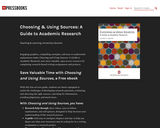
Choosing & Using Sources presents a process for academic research and writing, from formulating your research question to selecting good information and using it effectively in your research assignments. Additional chapters cover understanding types of sources, searching for information, and avoiding plagiarism. Each chapter includes self-quizzes and activities to reinforce core concepts and help you apply them. There are also appendices for quick reference on search tools, copyright basics, and fair use.

This purpose of this guide is to provide our faculty, students, staff and others in our community an understanding of copyright law and it's proper application in an academic environment. A better understanding and application of copyright law both avoids potential legal issues and makes us all better stewards of the intellectual property of others.

This guide provides resources on the topic of Copyright and Licensing, as a supplement to the OERTX Digital Information Literacy Hub.

No matter how long you’ve been an advocate of OER, you may sometimes feel like you need a (fun and nuanced) refresher on the nuts and bolts of “open.” This webinar will engage a panel of experts in a discussion ranging from the basics of copyright and Creative Commons licensing to the tough questions we inevitably encounter when working with open resources.
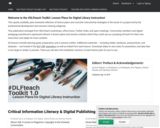
“Digital,” “library,” “pedagogy” — what happens when these three terms are brought together as the foundations of a community of practice? The strategies and insights gathered here suggest a preliminary answer to that question, but the short version might be: a lot. Digital access and affordances spark new approaches to primary sources; memes model scholarly conversation; hands-on work with APIs and web scraping quickly bring the rhetoric of the digital as seamless access to information back down to earth.
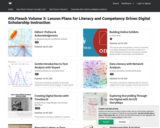
The nine lessons in this volume cover foundational digital tools like Voyant and Omeka and newer ones such as Transkribus and the International Image Interoperability Framework (IIIF). Most lessons focus on the act of making and engaging with tools, while others address misinformation and algorithmic bias. The structure and length of the lessons vary considerably, with some designed for standalone sessions and others spanning the duration of a course.
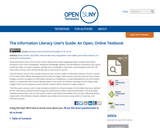
Good researchers have a host of tools at their disposal that make navigating today’s complex information ecosystem much more manageable. Gaining the knowledge, abilities, and self-reflection necessary to be a good researcher helps not only in academic settings, but is invaluable in any career, and throughout one’s life. The Information Literacy User’s Guide will start you on this route to success.The Information Literacy User’s Guide is based on two current models in information literacy: The 2011 version of The Seven Pillars Model, developed by the Society of College, National and University Libraries in the United Kingdom and the conception of information literacy as a metaliteracy, a model developed by one of this book’s authors in conjunction with Thomas Mackey, Dean of the Center for Distance Learning at SUNY Empire State College. These core foundations ensure that the material will be relevant to today’s students.The Information Literacy User’s Guide introduces students to critical concepts of information literacy as defined for the information-infused and technology-rich environment in which they find themselves. This book helps students examine their roles as information creators and sharers and enables them to more effectively deploy related skills. This textbook includes relatable case studies and scenarios, many hands-on exercises, and interactive quizzes.

This textbook addresses legal issues relevant to librarians, archivists, and information technologists. Topics covered include copyright and intellectual property, contracts and licensing, FOIA, open meetings acts, bonds and millages, and federal library legislation.

Regardless of what kind of material you're using, giving proper credit to the creator -- citing your sources -- is essential.
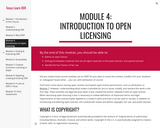
Did you realize these course modules are an OER? Do you want to reuse the content, modify it for your students or colleagues? Guess what … you can, with attribution of course!
You’ll learn more about reusing open content and explicit open license permissions, such as attribution, in Module 7. However, understanding what makes it possible for you to reuse, modify, and reshare this work is the first step. These activities are legal because when it was created the author released it with an open license. When discussing open licensing it also is necessary to review definitions of important terms and legal requirements of laws and principles applied to a creator’s work and how it can be used or reused. In addition to introducing and defining open licenses, this module will review and define copyright, fair use, and public domain.
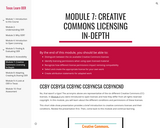
CCBY CCBYSA CCBYNC CCBYNCSA CCBYNCND: No, that wasn’t a typo! The acronyms above are representative of the six different Creative Commons (CC) licenses. In Module 4 you were introduced to open licenses and how they differ from all rights reserved copyright. In this module, you will learn about the different conditions and permissions of these licenses.

Scholars are pursuing an international reputation earlier in their careers. Early career researchers often encounter norms and expectations they may be unfamiliar with, specifically open access publishing, research data sharing mandates and establishing their scholarly identity via professional social media. They must learn to navigate the research lifecycle from topic selection to data collection and ultimately dissemination of their work. This text will help researchers in STEM and the social sciences navigate the complexities of academic research in the international research community. Utilizing a combination of text, visuals, and reflection, readers will learn to establish themselves as researchers in the academic community.
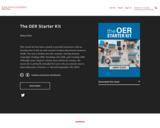
This starter kit has been created to provide instructors with an introduction to the use and creation of open educational resources (OER). The text is broken into five sections: Getting Started, Copyright, Finding OER, Teaching with OER, and Creating OER. Although some chapters contain more advanced content, the starter kit is primarily intended for users who are entirely new to Open Education. [Version 1.1. Revised September 5th, 2019.]

Shifting from ink on paper to digital text suddenly allows us to make perfect copies of our work. Shifting from isolated computers to a globe-spanning network of connected computers suddenly allows us to share perfect copies of our work with a worldwide audience at essentially no cost.
About thirty years ago this kind of free global sharing became something new under the sun. Before that, it would have sounded like a quixotic dream. Digital technologies have created more than one revolution. Let’s call this one the access revolution.

A poster describing similarities and differences between Open Access and Open Education

To understand Creative Commons and the licenses you need to have a basic understanding of copyright.
Copyright is a set of exclusive rights granted to a creator preventing others from copying, distributing, publicly performing, adapting, or doing almost anything else except read/view/listen to a work without the copyright holder's expressed permission. Its purpose is to protect the creator’s rights for a certain period and is granted in our constitution. Copyright, in the United States, is automatic from the moment something original is set in a tangible form that can be perceived by other humans or machines, meaning the moment is written down, recorded, performed for others, etc. Copyright lasts a long time and is balanced between a holder's intellectual property rights and public interests. These public interest exceptions are for parody, criticism, and for a disability as well as anything that falls under Fair Use or the TEACH Act. Copyright is also limited since you cannot copyright facts, figures, or ideas - just the expressions of those things. It also doesn't cover intellectual property that is better protected by patent or trademark law (think inventions or branding).

Creative Commons is a free licensing system that allows the author of a work to specify legal permissions for how the work may be used others, while retaining full copyright to it themselves. Creative Commons licenses are not an alternative to copyright. They sit on the shoulders of copyright law, and allow authors to easily modify copyright terms to encourage collaboration and sharing.